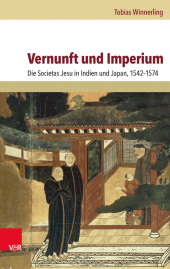 Neuerscheinungen 2014Stand: 2020-02-01 |
Schnellsuche
ISBN/Stichwort/Autor
|
Herderstraße 10
10625 Berlin
Tel.: 030 315 714 16
Fax 030 315 714 14
info@buchspektrum.de |

akg-images GmbH Archiv für Kun, Tobias Winnerling
(Beteiligte)
Vernunft und Imperium
Die Societas Jesu in Indien und Japan, 1542-1574. Dissertationsschrift
Mitarbeit: akg-images GmbH Archiv für Kunst und Geschichte
2014. 397 S. mit 2 Diagrammen. 23.2 cm
Verlag/Jahr: VANDENHOECK & RUPRECHT 2014
ISBN: 3-525-30065-4 (3525300654)
Neue ISBN: 978-3-525-30065-7 (9783525300657)
Preis und Lieferzeit: Bitte klicken
Das Buch untersucht die ersten dreißig Jahre der Missionierung Indien und Japans durch den Jesuitenorden.
When in 1542 the first Jesuit missionaries set sail to Asia, to travel to India, to Indonesia and to Japan in turn, they were obviously convinced that they could succeed, and that they would bring the Gospel to the East, and thus the East to Christ. One question that has not sufficiently been answered yet is: why should they have thought that? In examining the first thirty years of the Asian missions of the Society of Jesus this book closely inspects the organisational structures that shaped the missionary work and the actual doings of the rank-and-file missionaries in a praxeological way to answer that question. Rather than the up until now stressed abilities of the order´s members to adapt to foreign cultures, to accommodate or to acculturate themselves, it seems that the main guideline for their work was relying on what they knew best. Namely, a mental framework of thoroughly Aristotelian-Thomist thought shaping their notions about men, mind and logics, and the colonial European empires of their day shaping their views of organisation and hierarchy. These predispositions combined to make actual intercultural contact, or even mutual understanding, difficult to the extreme, if not impossible. In effect, the Jesuits missionary endeavours up until 1574 produced an entity that was an empire in its own right, of its own peculiar kind - spiritual, not territorial or economical. What they sought was mission, and what they got was dominion over souls.
When in 1542 the first Jesuit missionaries set sail to Asia, to travel to India, to Indonesia and to Japan in turn, they were obviously convinced that they could succeed, and that they would bring the Gospel to the East, and thus the East to Christ. One question that has not sufficiently been answered yet is: why should they have thought that? In examining the first thirty years of the Asian missions of the Society of Jesus this book closely inspects the organisational structures that shaped the missionary work and the actual doings of the rank-and-file missionaries in a praxeological way to answer that question. Rather than the up until now stressed abilities of the order s members to adapt to foreign cultures, to accommodate or to acculturate themselves, it seems that the main guideline for their work was relying on what they knew best. Namely, a mental framework of thoroughly Aristotelian-Thomist thought shaping their notions about men, mind and logics, and the colonial European empires of their day shaping their views of organisation and hierarchy. These predispositions combined to make actual intercultural contact, or even mutual understanding, difficult to the extreme, if not impossible. In effect, the Jesuits missionary endeavours up until 1574 produced an entity that was an empire in its own right, of its own peculiar kind spiritual, not territorial or economical. What they sought was mission, and what they got was dominion over souls.


